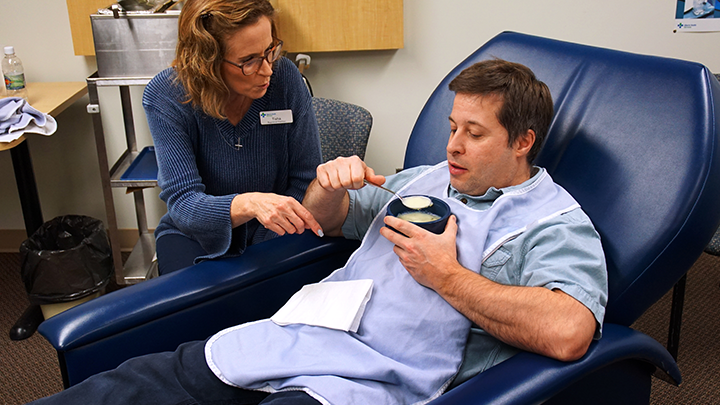
January 28, 2020

Clinical dietitian Tisha Lamboo, left, helps maintenance worker Chris Kontzie with his soup as part of a “lived experience” that aims to understand the barriers patients may go through during mealtimes.
Story and photo by Tracy Kennedy
ROCKY MOUNTAIN HOUSE — She may be in hospital with a broken ankle further complicated by her osteoporosis, but there’s absolutely nothing wrong with Laureen Fisher’s appetite.
The 79-year-old gives glowing reviews of mealtimes at Rocky Mountain House Health Centre (RMHHC) where she loves the variety of soups but, more importantly, she gets to enjoy her meals undisturbed.
“They get me set up, I have my medication before or after, then the kitchen staff brings the meal and it's really good,” says Fisher. “My roommate and I chat — and it's pleasant and relaxing.”
Helping patients eat their meals without interruption or other barriers to enjoyment is the goal of a new staff-education event now being piloted here, with plans to roll it out to more Central Zone sites.
The “lived experience” events promote Meals Matter, a provincial Nutrition and Food Services initiative designed to combat patient malnutrition. Data suggest 47 per cent of patients are malnourished upon admission to hospitals in Alberta.
Rocky held its lived experience event in December. A cross-section of site staff rotated through several stations — mimicking the barriers patients may encounter when trying to eat a meal in hospital. The stations represented the barriers identified as part of a Central Zone audit of patient mealtime experiences.
Staff took turns trying to eat while experiencing some sort of challenge, including having their blood pressure taken, or eating while lying down. Other challenges included difficulty opening packaging, staff interruptions and maintenance noise.
Most staff came to the same conclusion — it’s understandable if many patients feel annoyed, frustrated or helpless — and lose their appetite.
“The goals of the exercise are to better understand and empathize with the patient, and to change the staff’s perspective around mealtime,” says Stephanie Cox, a clinical dietitian at RMHHC.
“Often times, it’s seen as a low priority, and staff may interrupt meals with things they feel are more important. But we can’t overlook nutrition and the effect it has on recovery.”
Cox says the experience has left staff with food for thought, and has sparked discussions on how the site can best help patients, through changes in process or the small roles everyone can play.
“If we walk by a patient’s room and see they’re reaching to get to their food tray, we don’t need to be the patient’s nurse to go in and ask if we can help,” she says. “Patient care is a shared responsibility for all of our staff.”
Sometimes, it’s just about injecting some enthusiasm into mealtime.
Fisher says she always looks forward to hers.
“She loves the salmon with dill,” says her daughter, Joanne Fisher. “Last time, the kitchen staff came into her room and announced ‘we’ve got your favourite tonight!’
A retired farmwife, Fisher adds that, being in hospital, she’s not accustomed to so much inactivity.
“Everything is so tasty, but I told my roommate all we do is eat,” she says, with a laugh.